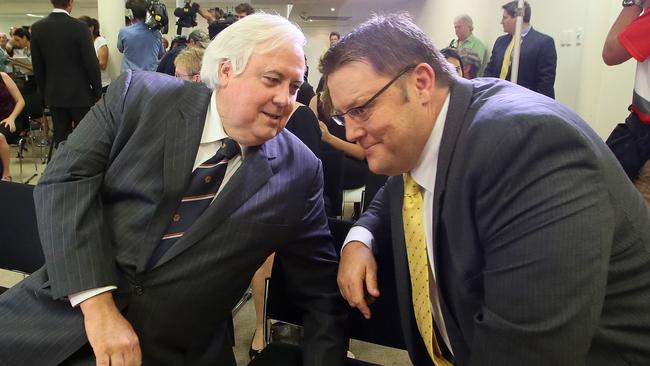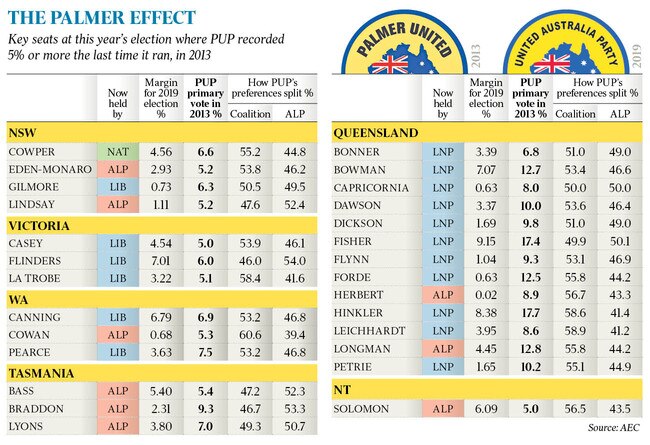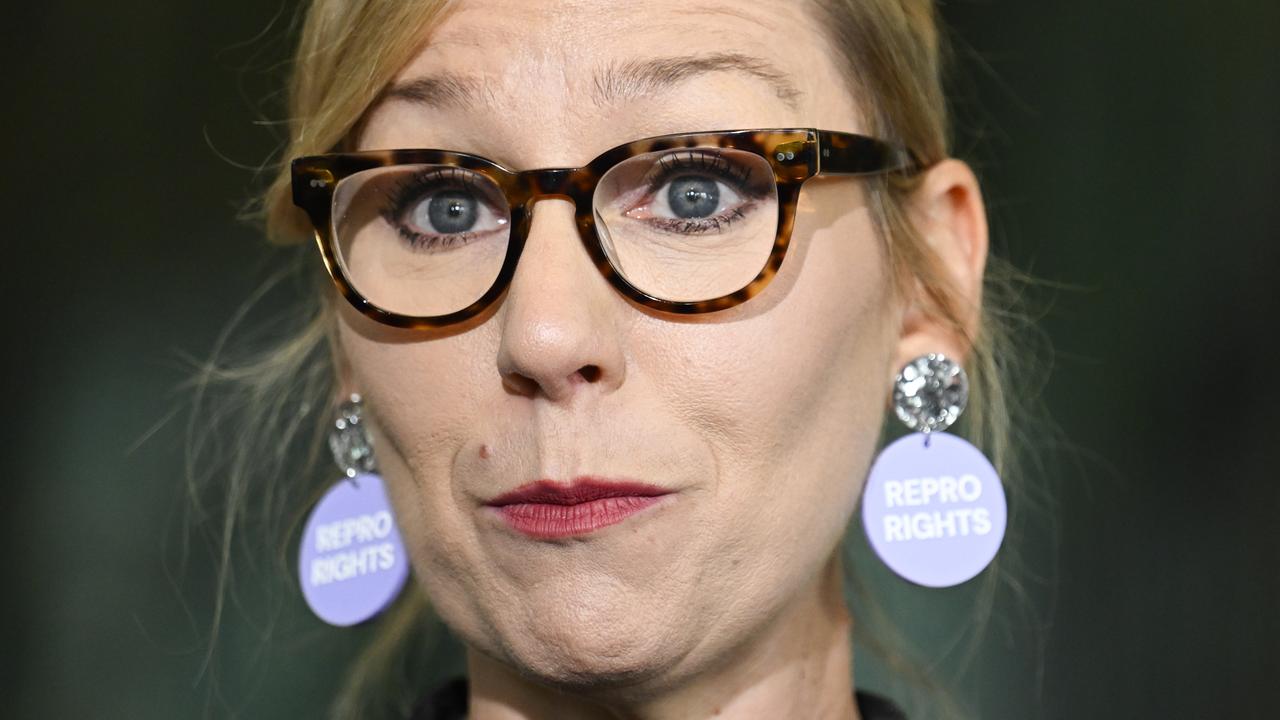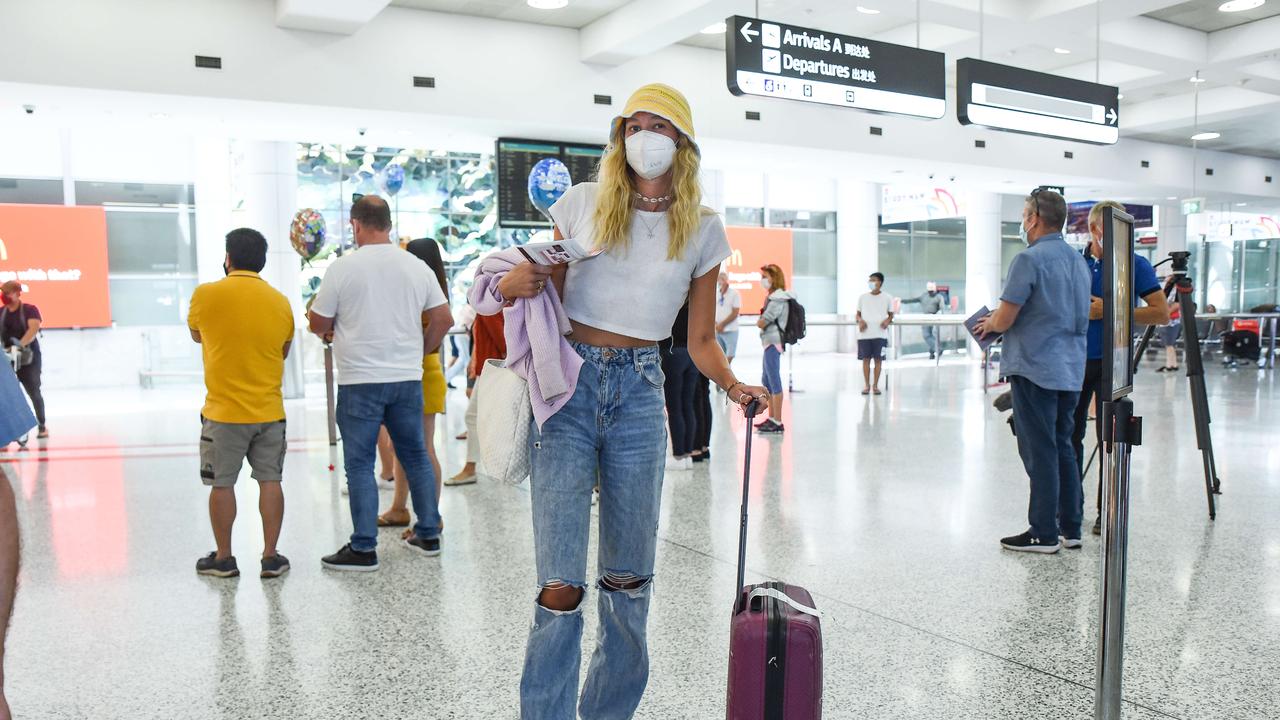Morrison puts Palmer preferences deal in play
Scott Morrison is on the verge of securing a preference deal with Clive Palmer that would all but guarantee him a Senate spot.

Scott Morrison is on the verge of securing a preference deal with Clive Palmer that would all but guarantee the Queensland billionaire a Senate spot and help ring-fence marginal seats the Coalition must hold to retain government.
The Australian understands that a deal was meant to have been sealed by this week, but negotiations are still ongoing over several Coalition seats.
Under the deal being finalised, Mr Palmer’s United Australia Party would be placed ahead of One Nation and Katter’s Australian Party on the Liberal and LNP how-to-vote cards for the Senate.
In return, UAP would preference the Liberals and LNP second on its how-to-vote cards — a move that could be a key factor in determining the outcome in a batch of marginal seats.
An exclusive Newspoll conducted for The Australian last weekend revealed Mr Palmer was set to become the kingmaker in a tightly contested election, with his party polling between 5 and 14 per cent of the primary vote in four marginal seats in four states.
At the 2013 election, preference flows from Mr Palmer’s Palmer United Party broke in favour of the Coalition on average 54 to 46 per cent. But Mr Palmer had no preference deal with the LNP and there were deep hostilities between the two parties.
A formal deal between the Liberals and the UAP would be expected to increase the preference flow towards Coalition candidates and potentially get it over the line in seats such as Herbert in north Queensland, which was lost in the 2016 election under Malcolm Turnbull.
A spokesman for Mr Palmer yesterday did not deny that a preference deal was imminent, saying: “It’s a secret.”
Senior Liberal sources said yesterday Mr Palmer lacked the resources to cover polling booths and hand out UAP how-to-vote cards, which might limit the deal to marginal Liberal and LNP seats.
Election candidates were required to lodge their nominations with the Australian Electoral Commission yesterday ahead of early voting commencing next Monday. The draw for ballot place positions will take place later today. There is no formal requirement for party how-to-vote cards to be endorsed by the AEC.

The Prime Minister all but confirmed discussions over preferences were taking place with the UAP, which is contesting all 151 seats. “As we come to close nominations, you’d expect that we’re talking to a number of parties,” he told Sky News.
“This election of course will be close. Everybody’s vote will matter. I’ll tell you who Labor Party will be talking to: they’ll be talking to the Greens as usual, Labor and the Greens backed in by GetUp. And Bill Shorten is the godfather of GetUp.”
Mr Palmer, who won the Queensland seat of Fairfax in 2013 but did not recontest it in 2016 after being mired in controversy, has launched a $30 million saturation advertising campaign in recent months. His advertising bill is expected to reach $50m by the May 18 election.
In recent weeks, Mr Palmer’s advertisements have stepped up their attacks on the Opposition Leader and Labor.
A preference deal between Mr Palmer and the Liberals would boost the government’s hopes of retaking the crucial western Sydney seat of Lindsay.
YouGov Galaxy managing director David Briggs, who runs Newspoll, said the latest surveys found that PUP preferences went 53.67 per cent to Liberal/LNP candidates and 46.33 to Labor in 2013.
“If the Coalition candidates could secure a higher proportion of the preferences then that would improve their chances in these seats,’’ Mr Briggs said.
Political pundits argue that the key to any preference deal may be Mr Palmer’s ability to cover polling booths to distribute how-to-vote cards.
There is speculation the Queensland businessman may pay “volunteers” to perform the service on May 18.
NSW senator and UAP parliamentary leader Brian Burston told The Australian that internal polling suggested the party would pick up a “handful of senators”.
He said a future Labor government would be concerned about the prospect of dealing with a more conservative Senate.
Senator Burston suggested that the UAP would preference the Liberals over the Labor Party, declaring: “We are more a right-wing party than left-wing party. We are polling in double digits in most states and we do our own polling regularly. If we achieve some form of power bloc in both houses, that would be great”.
Senator Burston — who defected from Pauline Hanson’s One Nation party last year — also launched a pre-emptive attack on any move by a newly elected Labor government to ram through its industrial relations agenda to reverse penalty rate cuts prior to the new Senate sitting in July.
In 2013, PUP preferences tended to favour incumbent MPs, which if repeated, in the absence of a deal, could frustrate Coalition attempts to make gains in Tasmania and NSW to offset expected losses in Victoria.
In the Tasmanian seat of Braddon, which Labor holds by 2.31 per cent, PUP picked up 9.3 per cent of the vote in 2013 with preferences flowing 46.7 per cent to the Coalition and 53.3 per cent to Labor. A repeat of the PUP vote for UAP this year and a similar preferences split could frustrate Coalition attempts to win the seat back.
In Lindsay — an electorate the Coalition desperately wants to reclaim from Labor, which holds it by just 1.11 per cent — UAP preferences also appear to be crucial. In 2013, PUP polled 5.2 per cent of the vote with preferences flowing 47.6 per cent to the Coalition and 52.4 per cent to Labor.
This week’s Newspoll suggests UAP is polling more strongly in Lindsay than PUP was in 2103, with 7 per cent of those surveyed saying they would vote for Mr Palmer’s party.
In Western Australia, where Attorney-General Christian Porter holds his seat of Pearce on a margin of just 3.63 per cent, UAP preferences also loom large.
In 2013, PUP recorded 7.5 per cent of the vote with preferences favouring the Coalition 53.2 per cent to 46.8 per cent.
Newspoll suggests UAP is tracking at around 8 per cent in Pearce this election.
In Mr Palmer’s home state of Queensland, his new party appears certain to play a decisive role in a number of contests if PUP preference flows are repeated on May 18.
In Herbert — held by Labor by just 0.02 per cent — PUP gained 8.9 per cent of the vote in 2013.
Newspoll suggests the UAP will top this with 14 per cent of the vote on May 18, making its preference flows crucial. In 2013, PUP preferences flowed 56.7 per cent to the Coalition compared with 43.3 per cent for Labor.
UAP could also act as a buffer in other key Queensland seats for the Coalition if it can retain or better PUP preference flows from 2013 and Mr Palmer’s new party attracts similar levels of support.
In Peter Dutton’s northern Brisbane seat of Dickson, held by the Coalition on a margin of 1.69 per cent, PUP polled 9.8 per cent of the vote in 2013 and preferences flowed 51 per cent to the Coalition and 49 per cent to Labor.
Palmer preferences could also prove crucial in the NSW south coast electorate of Gilmore held by the Coalition by just 0.73 per cent. PUP recorded 6.3 per cent of the vote in 2013 with preferences favouring the Coalition 50.5 per cent to 49.5 per cent.
In Cowper on the NSW north coast, where the Nationals are fighting to hold their 4.56 per cent margin, PUP polled 6.6 per cent in 2013. Its preferences favoured the Coalition 55.2 per cent to Labor’s 44.8 per cent.
Additional reporting: Joe Kelly



To join the conversation, please log in. Don't have an account? Register
Join the conversation, you are commenting as Logout